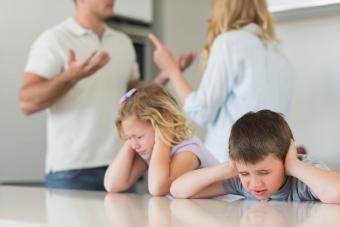
Gabrielle is an experienced freelance writer and Licensed Marriage and Family Therapist with experience using equine-assisted therapy.
Updated July 20, 2018
Divorce can be incredibly stressful for a family to go through. Although it can have an intense impact on the immediate family going through it, extended family may also feel a slew of uncomfortable emotions.

Divorce can be hard on children, but if there are irreconcilable differences between the parents that make the household volatile, it can be the healthiest option for the family. Maintaining an open, loving and communicative relationship creates the best environment for children whose parents are divorcing, and studies indicate these children adjust quite well to the new family system.
Kids can have a variety of reactions to divorce which can impact the quality of their relationship with both parents and their siblings. Parenting style and co-parenting abilities drastically impact how children adjust to this new family dynamic. There are several relationship shifts that can take place:
These unhealthy situations create chaos for the child or children, who become embroiled in the parent's unhealthy dynamic. This is not only unfair to the child but can cause layers of trauma that negatively impact the child when they become an adult. This sets them up to view unhealthy relationships as the norm and seek out partners who are reminiscent of their parents' relationship.
Depending on the mental health of the parents, the relationship with the child's mother and father can take a drastic hit. Children may:
Parents can maintain a healthy family structure post-divorce by never bad-mouthing each other in front of their child, by continuing to stay on the same page when it comes to co-parenting, and by maintaining a predictable schedule that accommodates the child's needs. Children tend to take sides if it is encouraged by the parents to do so. Parent's behavior can be subtle and unconscious, so it's important to pay close attention to what is expressed around a child, especially because they are sensitive to picking up on their parents' vibes.
Adults who learn about their parent's divorce may feel a mix of emotions. Often, a feeling of confusion and dishonesty cloaks their childhood memories. They may want to pull away briefly from their parents so they can process the situation. Adult children may lean on their siblings for comfort during this time. Siblings who have healthy relationships tend to support each other in times of stress. This can temporarily impact the relationship with their family until the experience has been fully processed.
In tricky circumstances where one parent cheats or betrays the spouse in any way, the adult child may begin to view their parent in a more negative light and may no longer feel the same way about them. This can create distance and shift the relationship in terms of closeness.
Are you InTheKnow ?
Extended family members may feel upset, betrayed, and confused by the divorce. They may side with their own family member or ostracize them for not sticking it out in the marriage. Ideally, extended family members provide support and learn to adjust to this new normal. If there are not children involved, extended family members may no longer wish to see or feel comfortable seeing the ex-spouse, which takes time to adjust to. If children or grandchildren are involved, it may feel awkward or uncomfortable at first to maintain the same relationship. Studies suggest a decrease in closeness with the ex-spouse and a decrease in time spent with the ex-spouse in general following a divorce.
Divorce can have a massive impact on family relationships and dynamics. Although it can be challenging and stressful to go through, families that maintain healthy communication and loving relationships tend to adjust better.